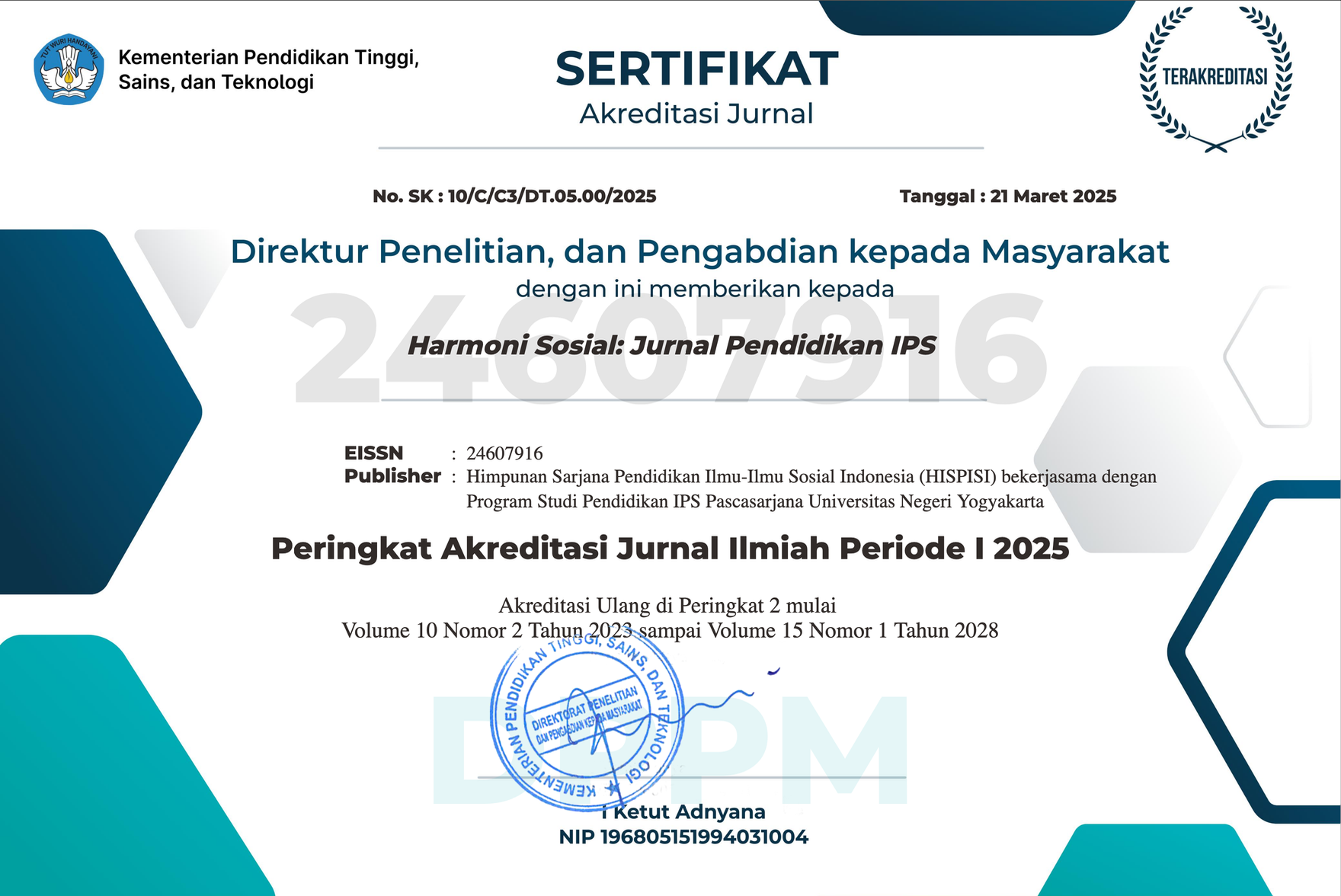The factors affecting national examination achievement in high schools
Downloads
Downloads
Adesoji, F. A. (2008). Students' ability levels and effectiveness of problem-solving instructional strategy. Journal of Social Sciences, 17(1), 5-8. Doi: https://doi.org/10.1080/09718923.2008.11892628
Anggarawati, D. (2017). Kontrol diri dan kecemasan siswa SMA dalam menghadapi Ujian Nasional (Unpublished bachelor thesis). Universitas Muhammadiyah Surakarta, Indonesia.
Basuki, N. T. (2009). Faktor- faktor yang mempengaruhi ujian nasional pada mata pelajaran matematika di Sulawesi Tengah. Yogyakarta: Program Pascasarjana UNY.
Berutu, M. H. A., & Tambunan, M. I. H. (2018). Pengaruh minat dan kebiasaan belajar terhadap hasil belajar biologi siswa SMA se-kota Stabat. Jurnal Biolokus: Jurnal of Biological Education and Research, 1(2), 109-115. Doi: http://dx.doi.org/10.30821/biolokus.v1i2.351
Brophy, J. E. (2013). Motivating students to learn. United Kingdom: Routledge.
Feriady, M., Harnanik, H., & Sunarto, St. (2012). Pengaruh persepsi siwa tentang keterampilan mengajar guru dan fasilitas belajar siswa terhadap minat belajar IPS kelas VIII SMP N 3 Purbalingga. Economic Education Analysis Journal, 1(2), 1-7.
Fiskum, T. A., & Jacobsen, K. (2012). Relation between the school environment and the children's behaviour. The Open Education Journal, 5(1). Doi: https://doi.org/10.2174/1874920801205010039
Ghultom, S. (2012). Nilai rata-rata UKG. Kompas (http://lipsus.kompas.com).
Gultom, A., & Silitonga, P. M. (2009). Pengaruh kemampuan awal dan model pembelajaran terhadap hasil belajar kimia SMA. Jurnal Pendidikan Matematika dan Sains, 4(2).
Komba, W. L., Anangisye, W. A., & Katabaro, J. K. (2013). The development of teacher professional identity at the University of Dar es Salaam: Perceptions and influencing factors. Journal of International Cooperation in Education, 15(3), 187-204.
Mappeasse, M. Y. (2009). Pengaruh cara belajar dan motivasi belajar terhadap hasil hasil belajar Programmable Logic Controller (PLC) siswa kelas III jurusan listrik SMK Negeri 5 Makassar. Jurnal MEDTEK, 1(2).
Narwoto, N., & Soeharto, S. (2015). Faktor-faktor yang berpengaruh terhadap prestasi belajar teori kejuruan siswa SMK. Jurnal Pendidikan Vokasi, 3(2), 222-233. Doi: https://doi.org/10.21831/jpv.v3i2.1603
Purnamasari, D. A. (2013). Strategi meningkatkan hasil ujian nasional mata pelajaran ekonomi. Jurnal Ilmiah Pendidikan Ekonomi IKIP Veteran Semarang, 1(2), 38-48.
Raharjayanti, Y. (2019). Dukungan sosial keluarga dan self efficacy siswa SMP dalam menghadapi Ujian Nasional. Jurnal Promkes: The Indonesian Journal of Health Promotion and Health Education, 7(2), 133-143. Doi: http://dx.doi.org/10.20473/jpk.V7.I2.2019.133-143
Setiawati, L., & Sudira, P. (2015). Faktor-faktor yang mempengaruhi prestasi belajar praktik kejuruan siswa SMK program studi keahlian teknik komputer dan informatika. Jurnal Pendidikan Vokasi, 5(3), 325-339. Doi: https://doi.org/10.21831/jpv.v5i3.6487
Slameto, S. (2010). Belajar dan faktor yang mempengaruhinya. Jakarta: Rineka Cipta.
Sudiarta, N., Marhaeni, A. A. I. N., & Suhandana, A. (2013). Kontribusi tingkat intelegensi, nilai Ujian Nasional bahasa Inggris SMP, minat belajar bahasa Inggris terhadap prestasi belajar bahasa Inggris siswa kelas X SMA Negeri 2 Amlapura tahun pelajaran 2012/2013. E-Journal Program Pascasarjana Universitas Pendidikan Ganesha Program Studi Administrasi Pendidikan, 4. Doi: https://doi.org/10.23887/japi.v4i1.961
Solehah, L. F. N. (2012). Faktor-faktor penyebab kecemasan siswa dalam menghadapi ujian nasional. Perspektif Ilmu Pendidikan, 25(XVI), 16-32. Doi: https://doi.org/10.21009/PIP.251.3
Sulistyo, G. H. (2015). English as a measurement standard in the national examination: Some Grassroots' voice. Teflin journal, 20(1), 1-24. Doi: http://dx.doi.org/10.15639/teflinjournal.v20i1/1-24.
Wagiran, W. (2015). Metodologi penelitian pendidikan. Yogyakarta: Budi Utomo
Widhiarso, W. (2008). Menghitung sumbangan efektif terhadap variabel dependent. Yogyakarta: Fakultas Psikologi UGM.
Yunita, Y., Sunardi, S., & Dafik, D. (2013). Identifikasi Faktor Penyebab Rendahnya Penguasaan Materi Dalam Ujian Nasional Matematika SMA/MA program IPA tahun ajaran 2009/2010 di Kabupaten Jember bagian utara dan timur. Pancaran Pendidikan, 2(1), 197-208.
Yuzarion, Y. (2017). Faktor yang mempengaruhi prestasi belajar peserta didik. Ilmu Pendidikan: Jurnal Kajian Teori dan Praktik Kependidikan, 2(1), 107-117. Doi: http://dx.doi.org/10.17977/um027v2i12017p107
The Authors submitting a manuscript do so on the understanding that if accepted for publication, copyright publishing of the article shall be assigned to Harmoni Sosial: Jurnal Pendidikan IPS
 | Harmoni Sosial: Jurnal Pendidikan IPS by http://journal.uny.ac.id/index.php/hsjpi is licensed under a Creative Commons Attribution-ShareAlike 4.0 International License. |









 ISSN Print
ISSN Print









